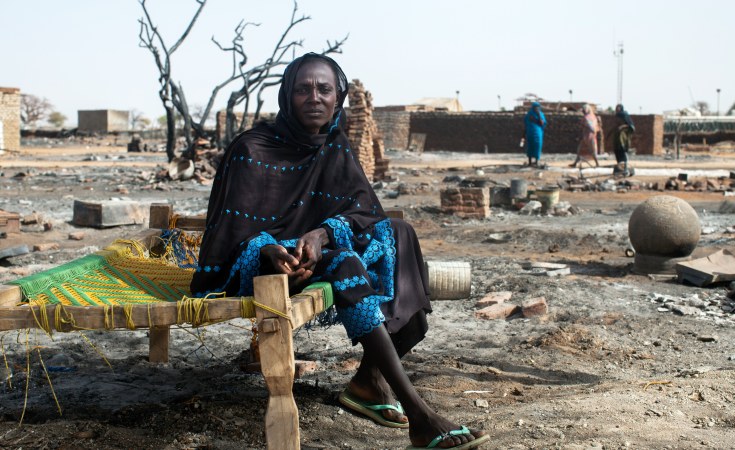Dozens of women and girls have been raped and sexually assaulted by fighters in Sudan as the conflict approaches its third month.
Sudan's Gender Based Violence Unit has documented nearly 90 cases of sexual assault and rape of women and girls since fighting erupted in April between the paramilitary Rapid Support Forces (RSF) and the Sudanese Armed Forces.
Sulima Ishaq Sharif, a prominent human rights defender in the North African country, told DW that there's a much larger number of cases going unreported.
"We know that so many atrocities have been committed in the civilian population, but we don't have all of the numbers," said Sharif.
Victims of sexual violence are struggling to access services, such medical care for any injuries, emergency contraception or medication that can stop HIV infection.
Only weeks after the conflict began on April 15, the United Nations had already reported critical shortages of supplies for the clinical management of rape.
Health care across the country is on the verge of collapse as most of the nation's health facilities have been occupied by RSF forces, bombed or looted. Medicines are in short supply and many medical workers have fled the country.
RSF blamed for rapes
Various organizations are collecting survivor accounts, including the Gender Based Violence Unit and the Strategic Initiative for Women in the Horn of Africa, known as SIHA.
According to both of these, survivors overwhelmingly identified the perpetrators as RSF fighters.
The majority of sexual assaults are taking place in Khartoum -- which is largely controlled by the RSF -- where it continues to loot and occupy people's houses, at times raping women and girls in front of their husbands, their fathers or their siblings.
"If they find women and girls in the houses, they can rape them," said Dalia Obeid, advocacy and human rights officer at SIHA. "They have to fear -- within their own homes, within their own families. They're not safe."
Rape as weapon of war
Before she fled Khartoum last week, Amira Saleh spent 76 days confined inside her family home. The 26-year-old said she was originally afraid of being shot in the fighting, but that fear was replaced by the dread of being sexually assaulted or raped.
"My mum and the other women in the neighborhood decided not to allow us to go out for whatever reason," she told DW. "We were afraid that if we go out and seen by those Rapid Support Forces, we can easily be expose to a rape or being assaulted sexually."
"The RSF is using sexual assault deliberately," she said.
Rapes have also been documented in Nyala and El Geneina in the western region of Dafur.
But, Obeid stressed, sexual assaults, rapes and abductions of women and girls are happening across Sudan and are increasing in intensity.
"There is a clear pattern that the RSF is targeting women and girls in this war to plant fear in civilians," said Obeid, who fled Khartoum after the outbreak of the conflict. "This is one of their tactics of war."
RSF has a history of using rape
Obeid and Sharif both say that these reports come as no surprise given the RSF's history using rape as a weapon of war in Darfur, where the paramilitary group has its roots.
The RSF was created out of Darfur's notorious Janjaweed militias in 2013 to fight rebel groups in the region.
Human Rights Watch, for example, documented mass rape by the RSF in numerous towns and villages in Dafur over an extended period.
"First-hand accounts of orders from commanders to commit crimes and the RSF's repeated use of abusive practices indicate that they were systematic," according to a 2015 HRW report about atrocities in Dafur.
RSF paramilitaries are also believed to have carried out more than 60 rapes as they violently dispersed a peaceful pro-democracy protest camp in Khartoum in 2019.
RSF commander Mohammed Hamdan Dagalo, commonly known as Hemedti, said last week that he would establish a field court to investigate offenses -- including rape -- allegedly committed by the RSF since fighting broke out between his forces and the Sudanese army, led by Abdel Fattah al-Burhan.
"These violations are against the RSF law and the instructions of its senior leadership," he said in an audio address. "We are going to address them firmly and seriously. I am here sincerely assuring our people that we reject and condemn any violation against civilians, including those believed to have been committed by our RSF forces."
For human rights advocate Obeid, this statement is "absolute nonsense."
"[The RSF have] been committing these crimes since day one," she told DW, "and they are still on the street committing them now."
UN condems sexual violence
United Nations agencies on Wednesday voiced their "shock and condemnation" at the increasing reports of sexual violence against women in Sudan.
"We are receiving shocking reports of sexual violence against women and girls, including rape. And in the aftermath of such cruelty and brutality, the women and girls are left with little or no medical and psychosocial support," UN High Commissioner for Human Rights, Volker Türk, said in a press statement.
Sulima Ishaq Sharif says the sexual violence is "intensifying the trauma" of a conflict in which more than 1,000 civilians have been killed and nearly 3 million people have been displaced.
"Women have no protection," she said. "Women know any kind of woman could be exposed to this kind of sexual violence. It's made them expect the worst."
Michael Atit in Juba contributed to this report.
Edited by: Keith Walker
While you're here: Every weekday, we host AfricaLink, a podcast packed with news, politics, culture and more. You can listen and follow AfricaLink wherever you get your podcasts.


